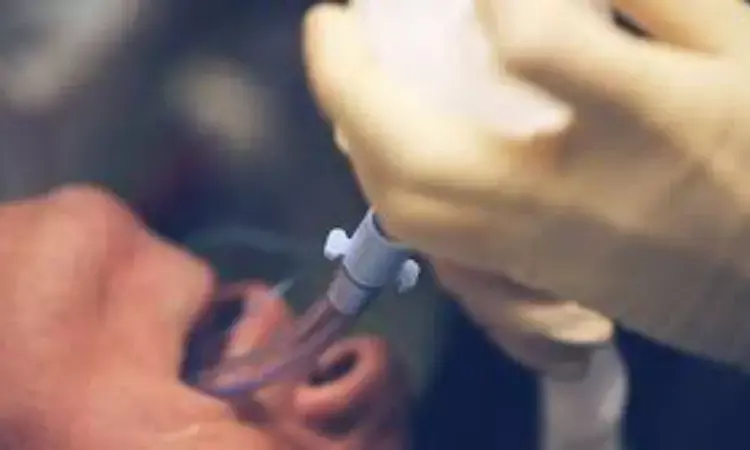- Home
- Medical news & Guidelines
- Anesthesiology
- Cardiology and CTVS
- Critical Care
- Dentistry
- Dermatology
- Diabetes and Endocrinology
- ENT
- Gastroenterology
- Medicine
- Nephrology
- Neurology
- Obstretics-Gynaecology
- Oncology
- Ophthalmology
- Orthopaedics
- Pediatrics-Neonatology
- Psychiatry
- Pulmonology
- Radiology
- Surgery
- Urology
- Laboratory Medicine
- Diet
- Nursing
- Paramedical
- Physiotherapy
- Health news
- Fact Check
- Bone Health Fact Check
- Brain Health Fact Check
- Cancer Related Fact Check
- Child Care Fact Check
- Dental and oral health fact check
- Diabetes and metabolic health fact check
- Diet and Nutrition Fact Check
- Eye and ENT Care Fact Check
- Fitness fact check
- Gut health fact check
- Heart health fact check
- Kidney health fact check
- Medical education fact check
- Men's health fact check
- Respiratory fact check
- Skin and hair care fact check
- Vaccine and Immunization fact check
- Women's health fact check
- AYUSH
- State News
- Andaman and Nicobar Islands
- Andhra Pradesh
- Arunachal Pradesh
- Assam
- Bihar
- Chandigarh
- Chattisgarh
- Dadra and Nagar Haveli
- Daman and Diu
- Delhi
- Goa
- Gujarat
- Haryana
- Himachal Pradesh
- Jammu & Kashmir
- Jharkhand
- Karnataka
- Kerala
- Ladakh
- Lakshadweep
- Madhya Pradesh
- Maharashtra
- Manipur
- Meghalaya
- Mizoram
- Nagaland
- Odisha
- Puducherry
- Punjab
- Rajasthan
- Sikkim
- Tamil Nadu
- Telangana
- Tripura
- Uttar Pradesh
- Uttrakhand
- West Bengal
- Medical Education
- Industry
Spontaneous-breathing trials with pressure-support ventilation no better than trials using T-piece: NEJM

France: Among patients with a high risk of extubation failure, the use of pressure-support ventilation (PSV) fails to increase ventilator-free days at day 28 compared to a T-piece, research in the New England Journal of Medicine (NEJM) has shown.
Spontaneous-breathing trials can be performed using pressure-support ventilation or a T-piece. It is unknown whether PSV trials may lead to a shorter time to tracheal extubation without resulting in a higher reintubation risk than T-piece trials in patients at high risk of extubation failure.
A team of researchers from France led by Arnaud W. Thille conducted a multicenter, open-label trial that included patients at high extubation failure risk (i.e., were more than 65 years of age or had an underlying chronic respiratory or cardiac disease). They were randomly assigned to undergo spontaneous-breathing trials using either pressure-support ventilation with a pressure-support level of 8 cm of water and no positive end-expiratory pressure or a T-piece.
The study's main outcome was the total time without exposure to invasive ventilation, which was reported as the number of ventilator-free days at day 28 following the initial spontaneous-breathing trial. Secondary outcomes were extubation within 24 hours, extubation within seven days following the initial spontaneous-breathing trial, and reintubation within seven days after extubation. The analysis included a total of 969 patients; 484 were in the PSV group, and 485 were in the T-piece group).
The study demonstrated the following findings:
- The median number of ventilator-free days was 27 in the PSV group and 27 in the T-piece group at day 28 (difference, 0 days).
- Extubation was performed within 24 hours in 77.7% of patients in the PSV group and 72.2% of patients in the T-piece group (difference, 5.5 percentage points), and extubation was performed within seven days in 97.7% of patients and 94.4% patients, respectively (difference, 3.3 percentage points).
- Reintubation was performed in 14.9% of patients in the PSV group and 13.6% in the T-piece group.
- A cardiac or respiratory arrest was a cause for reintubation in nine patients (6 in the T-piece group and 3 in the PSV group).
"Spontaneous-breathing trials performed with pressure-support ventilation did not lead to significantly more ventilator-free days at day 28 compared to spontaneous-breathing trials performed with a T-piece in patients with a high risk of extubation failure," the researchers wrote in their conclusion.
Reference:
Thille AW, Gacouin A, Coudroy R, Ehrmann S, Quenot JP, Nay MA, Guitton C, Contou D, Labro G, Reignier J, Pradel G, Beduneau G, Dangers L, Saccheri C, Prat G, Lacave G, Sedillot N, Terzi N, La Combe B, Mira JP, Romen A, Azais MA, Rouzé A, Devaquet J, Delbove A, Dres M, Bourenne J, Lautrette A, de Keizer J, Ragot S, Frat JP; REVA Research Network. Spontaneous-Breathing Trials with Pressure-Support Ventilation or a T-Piece. N Engl J Med. 2022 Oct 26. doi: 10.1056/NEJMoa2209041. Epub ahead of print. PMID: 36286317.
Dr Kamal Kant Kohli-MBBS, DTCD- a chest specialist with more than 30 years of practice and a flair for writing clinical articles, Dr Kamal Kant Kohli joined Medical Dialogues as a Chief Editor of Medical News. Besides writing articles, as an editor, he proofreads and verifies all the medical content published on Medical Dialogues including those coming from journals, studies,medical conferences,guidelines etc. Email: drkohli@medicaldialogues.in. Contact no. 011-43720751


